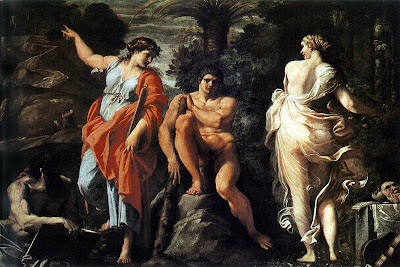I was going to write about Herakles' death for this "d," but I wanted to have time to ponder it all. I'll be writing about his death and Deïanira (another possiblity I thought of) soon. This time I'm going to look into Herakles' 12th and last labor, perhaps the most dangerous one of all.

Kerberos (Cerberus) is the three-headed (though sometimes fifty or one-hundred headed) hound who guards the gates of Hades, making sure the shades entered the Underworld, but never escaped back into the world of the living. He's the son of Typhaon and Echidna, who are also the parents of the Hydra, which Herakles killed previously. Kerberos has a number of descriptors. He's called dreaded hound (deinos kunos), jagged-toothed, with no pity, unspeakable, unmanageable, savage, powerful, bronze-barking, fierce, etc. Kerberos was not something you'd want to mess with, that's for sure. Eurystheus must have thought this Labor was the one out of all the others that would leave Herakles unsuccessful. After all, how could a mortal enter into Hades and return, not only with their life, but with Kerberos? It seemed impossible. One only entered Hades by dying (with a few exceptions, like Orpheus) or if they were a god. Herakles was determined not to fail and set out to complete this Labor.
To prepare himself for the journey into Hades, he became an initiate into the Eleusinian Mysteries. Herakles participated in the Lesser Mysteries, which included him being cleansed of the guilt from slaughtering the Centaurs. I plan on researching Herakles role in the Mysteries at a later time, but for now, all we need to know was he was initiated and cleansed. I don't know how long this took, but it was a necessary step. After this, Herakles was ready to enter Hades.
He chose to enter as one would enter as a god and hero (as dying wasn't an option), using various caves, chasms and entrances. The most common location given for Herakles' descent into Hades is a cave in Tainaron, Laconia (where Orpheus entered). Today it's known as Cape Tainaron or Cape Matapan. It's the southern most point of mainland Greece and has long been held as an entrance into the Underworld. He is accompanied and helped with this dangerous feat by Hermes and Athene, who help him traverse the Underworld.
Homer, Odyssey 11. 623 ff (trans. Shewring) (Greek epic C8th B.C.) :
"[The ghost of Herakles addresses Odysseus in Hades:] ‘He [Eurystheus] once sent me even here [to Haides] to fetch away the hound of Haides, for he thought no task could be more fearsome for me than that. But I brought the hound out of Haides' house and up to earth, because Hermes helped me on my way, and gleaming-eyed Athene.’"
Like everyone who entered Hades, he needed to cross the river Styx and to do this he needed to be ferried by Kharon (Charon). This was a problem as Kharon required one to be dead and to give payment (a coin usually placed under the tongue of the dead provided this). Herakles met neither requirement, but this wasn't about to stop him from completing his mission. Accounts aren't detailed, but some say Herakles overpowered Kharon with strength and managed to cross the Styx. A few places mention, for this, Kharon was punished by Hades by chaining him to his oar for a year!
Once in Hades, he saw the usual sights-- shades. He saw Meleager, a hero who recently died and he asked Herakles to do him a favor and marry his sister, Deïanira. Herakles vowed that he would. Deïanira would play an important role later on, with Herakles' death, but I'll save that tale for another time!
Some shades were frightened of him (it must have been odd, seeing a living person down there) and fled. While he was down there he saw Theseus, a fellow hero and friend, and Pirithous, king of the Lapiths (Theseus' companion). Both of them were being punished by Hades for attempting to abduct Persephone. See, Theseus and Pirithous wanted to marry daughters of Zeus and set out to claim their picks. Theseus chose Helen and managed to abduct her (though she was rescued by The Dioskouri, her brothers). Pirithous wanted Persephone and both of them traveled into Hades to find her. When they were in the outskirts of Tartarus, Theseus sat down on a rock and found that he couldn't move. He was frozen in place as was Pirithous. Around them Furies punished them. For many months they were in darkness, doomed. Herakles came upon them and set out to free them. He managed to get Theseus free, either by appealing to Persephone or by sheer strength (removing him from the rock). Pirithous was not so lucky, as when Herakles tried to remove him from the rock, the earth violently shook. Herakles left Pirithous to his fate, not wanting to anger Hades further. Theseus would go on to return to Athens and continue on his journeys.
Herakles also fought with Hades' cowheard, Menoetes, after Herakles killed one of the cattle to use to talk to the dead (via blood sacrifice). Herakles would have killed him if Persephone didn't come to Menoetes' rescue.
 |
| Heracles & Cerberus, Francisco De Zurbaran, 1634 |
After all this, Herakles entered the next phase of his task, meeting Hades himself. Most accounts add the meeting of Hades, though some don't mention it. This meeting must have been an interesting one! But what we know of it is little, only that Herakles asked Hades if he could take Kerberos with him to complete the task. Some say Hades was pissed to find a mortal trespassing and that Persephone pleaded with Hades to give Herakles permission to capture his hound. Surprisingly, Hades allowed it provided Herakles didn't use any weapons and returned the hound (alive). Hades must have thought this would be
very difficult, if not impossible. Remember all those descriptors for Kerberos? He wasn't a nice doggy!
Herakles finally gets to Kerberos and the fight begins. It was dangerous one. Kerberos' barbed and poisonous tail tried to pierce Herakles' flesh, but his trusty lion pelt warded off the attack. He tried to rip and bite at his flesh with his three heads. Eventaully, Herakles managed to get the hound by the throat, choking him. Kerberos yielded and was bound with unbreakable chains.
_03.JPG) |
| Aconitum napellus |
One side myth I came across was that from Kerberos' saliva that dripped to the ground sprung a plant called Aconite. It was a poison and later Medea would use it to in an attempt to poison Theseus. It was called
akoniton because it grew without dirt, in barren areas. Hekate also used the plant/poison. It's a pretty plant!
Herakles, with Kerberos chained, drags the hound out of the entrance to Hades into the land of the living. It must have been a
weird experience for Kerberos-- to be out of Hades, to be surrounded by weird things and all things
living. If the fight with Herakles didn't put him into submission, I would think the shock of the new environment did! Herakles alternately drags Kerberos or carries him slung over/around his shoulders. Hermes and Athene are also said to accompany him as he leaves Hades and enters the land of the living once more. Some add that Persephone was there as well, to see to the task.

Herakles and the hound make it back to Tiryns where he presents the Hound of Hades to Eurystheus. I found a vase painting of this scene. It's funny! Eurystheus hides in a pithos (storage jar) at the sight of the hound. I can't laugh too much at this though, because in his place, I probably would have hid myself! No one expected Herakles to enter into Hades and return alive and with Kerberos. Eurystheus was so freaked out he wanted the hound returned immediately. Herakles, already knowing he had to return the hound complied and went back to the Underworld to return him. With this capture of Kerberos, Herakles was finally finished with his Labors.
I thought this was an interesting quote that tries to get into Hera's head after witnessing this--
Seneca, Hercules Furens 46 ff (trans. Miller) (Roman tragedy C1st A.D.) :
"[Hera complains of Herakles:] ‘Nor is earth vast enough for him [Herakles]; behold, he has broken down the doors of infernal Jove [Haides], and brings back to the upper world the spoils of a conquered king [i.e. the hound Kerberos]. I myself saw, yes, saw him, the shadows of nether night dispersed and Dis [Haides] overthrown, proudly displaying to his father [Zeus] a brother's spoils. Why does he not drag forth, bound and loaded down with fetters, Pluto [Haides] himself, who drew a lot equal to Jove's? Why does he not lord it over conquered Erebus and lay bare the Styx? It is not enough merely to return; the law of the shades has been annulled, a way back has been opened from the lowest ghosts, and the mysteries of dread Death lie bared. But he, exultant at having burst the prison of the shades, triumphs over me, and with arrogant hand leads through the cities of Greece that dusky hound. I saw the daylight shrink at sight of Cerberus, and the sun pale with fear; upon me, too, terror came, and as I gazed upon the three necks of the conquered monster I trembled at my own command.’"
*
With the Labors complete, Herakles was no longer bound to Eurystheus and was free to go on other adventures. More on that later!
I was planning on writing my thoughts, but this took longer than I expected to write! I'll come back later and add my impressions. :-)
Sites of Interest:
Wiki: Cape Matapan
Eleusinian Mysteries
Wiki: Theseus in Hades
Wiki: Cerberus
Capture of Cerberus
Theoi: Kerberos



_03.JPG)











